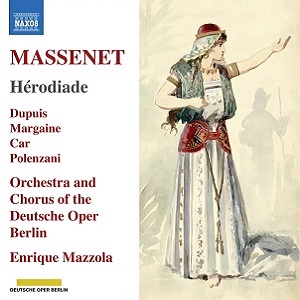
Jules Massenet (1842-1912)
Hérodiade, opera in four acts (1878-1879, revised 1884)
Libretto by Paul Milliet and Henri Grémont (Georges Hartmann), after the story by Gustave Flaubert
Hérodiade: Clémentine Margaine, mezzo-soprano
Salomé: Nicole Car, soprano
Hérode: Étienne Dupuis, baritone
Jean: Matthew Polenzani, tenor
Orchestra and Chorus of Deutsche Oper Berlin/Enrique Mazzola
rec. live, June 2023, Deutsche Oper Berlin, Germany
Booklet with notes and synopsis in English and German. French libretto available online
Naxos 8.660540-41 [2 CDs: 158]
Jules Massenet’s Hérodiade is a version of the biblical tale of Salome, with several differences from the story in Richard Strauss’s Salome. Here, Herodias (Hérodiade) and Salome at first do not know they are mother and daughter: Herodias abandoned her child to pursue Herod. It is the mother, not the daughter, who demands John the Baptist’s head. Salome loves John (Jean). He initially responds to her affection by telling her to seek a more spiritual love, but by Act 4 he is in love with her too. Herod tells Salome of his passion for her, so Herodias aims to kill them both, and John. When John is executed, Salome tries to kill Herodias, who has learned – and now reveals – that she is the girl’s mother. So, in a rather abrupt ending Salome stabs herself.
Paris rejected the new work. The first performance was at the Théâtre de la Monnaie, Brussels, on 19th December 1881, where it had great success. But when it later ran in Lyon, the archbishop there objected to the showing of John the Baptist onstage, let alone John who falls in love with Salome. The cleric gave Massenet a minor excommunication, presumably the limit of his powers. The Pope declined to upgrade that judgement to full excommunication. Perhaps his Holiness had learned of the fine music that Massenet had given John, and indeed the whole cast, to sing.
For a first taste of the charm and invention the composer brought to his subject, head for CD1, track 11, where Salome and John have the first of their two excellent duets. John is sung by American tenor Matthew Polenzani, an attractive voice well up to the high-lying parts of this role; yet he can also frighten Herodias with his accusations and repeated cry of “Jézabel!”. Salome is soprano Nicole Car, no less alluring vocally, and appropriately youthful-sounding. Her first number, extolling John’s qualities, is the first aria proper in the score (CD1, track 5). Il est doux, il est bon is one of the score’s plums.
In another of the opera’s more famous arias, Vision fugitive (CD1, track 15), Herod – sung by baritone Etienne Dupuis – lies on a couch and fantasises about Salome, helped by a possibly mind-altering “potion”. Dupuis sings very well and brings the right sort of fervour, impetuous in his passionate ambitions; he is suave when he needs to be. In the title role of Herodias, Clémentine Margaine’s splendid mezzo-soprano serves her well whether she is being anxious, amorous or angry. Or all three in sequence, as in her Act I scene Ne me refuse pas (CD1, track 9). There are three ‘voices’ but just one vocalist – remarkable singing.
The smaller roles are well taken, led by the Phanuel of Marko Mimica and the Vitellius of Dean Murphy. The Orchestra and Chorus of Deutsche Oper Berlin are splendid. The level of execution by everyone involved is a tribute to what they had all achieved live over three nights in June 2023, from which the recording was compiled. Enrique Mazzola directs with what sounds like total belief in the work itself.
The sound is clear and immediate, but with a little resonance not always heard in the dryness of several of Europe’s leading opera houses. There is no libretto, and the offer of a French text only from the Naxos website is hardly a substitute for most opera lovers. The booklet is otherwise very helpful, with plenty of background material, a full synopsis of a not very cohesive or persuasive plot, and photos and biographical notes on every singer in the cast, not only the leads. The work itself is no Manon or Werther, but holds an honoured place, I think, perhaps even in the next tier of Massenet’s twenty-eight operas.
Roy Westbrook
Other cast
Phanuel: Marko Mimica, bass-baritone
Vitellius: Dean Murphy, baritone
A High Priest: Kyle Miller, baritone
A Voice: Thomas Cilluffo, tenor
A Young Babylonian: Sua Jo, soprano
Buying this recording via a link below generates revenue for MWI, which helps the site remain free




















